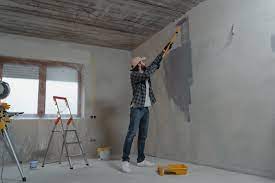DIY vs. Professional Drywall Installation: Pros and Cons
Few chores are as popular and important in home renovation projects as drywall installation. Whether you’re remodeling a room, finishing a basement, or patching damaged walls, you’ll probably have to decide between hiring a drywall business with expertise or doing it yourself (DIY). Every option has pros and cons of its own, and the one you select will have a big influence on how your project turns out. We’ll weigh the benefits and drawbacks of both professional and do-it-yourself drywall installation in this blog, enabling you to make the decision that best meets your requirements.
Installing Drywall on Your Own:
Advantages:
1. Cost Savings: The possibility of cost savings is what attracts a lot of homeowners to DIY drywall installation. If you’re comfortable doing the work yourself, you can stretch your budget even further by removing labor charges.
2. Total Control: You have complete control over every facet of the job when you decide to do it yourself. Without outside interference, you can choose your favorite materials, determine when to start and end, and make design decisions.
3. Learning Experience: Taking on a job like installing drywall can be a great way to pick up new abilities and information. Learning how to measure, cut, and hang drywall may be a rewarding experience, not to mention the feeling of success you get when the task is done.
4. Flexibility: Working on do-it-yourself projects lets you choose your own hours. You can modify your work schedule to accommodate your everyday schedule, take breaks as needed, and work at your own speed.
5. Feeling of Accomplishment: Finishing a do-it-yourself drywall installation can give you a strong sense of accomplishment. It’s difficult to top the gratification of taking a step back and appreciating a job well done.
Drawbacks:
1. Expertise and Familiarity: Installing drywall involves more than merely nailing sheets to the wall. For the finish to be seamless and expert, particular knowledge and expertise are needed. Lack of these could result in noticeable seams, uneven surfaces, or other flaws.
2. Time-Consuming: Installing drywall yourself can take a lot of time, particularly if you’re not skilled. A project may have frustrating delays due to errors or problems.
3. Quality Control: It can be difficult for novices to attain a professional-level finish. A less-than-perfect appearance might be caused by inadequate mudding, sanding, or taping, and resolving these problems can be expensive and time-consuming.
4. Physical Demands: It’s important to recognize that installing drywall has physical requirements. It can be physically taxing to handle big sheets of drywall, work overhead, and even spend long hours in awkward positions.
5. Tools and Materials: You will need to purchase the required tools and materials, including joint compound, drywall sheets, tape knives, sandpaper, and more, in order to start a do-it-yourself drywall job. Some of the cost reductions may be negated by these expenses as they accumulate.
Installing Drywall Professionally:
Advantages:
1. Knowledge: Experience and knowledge are what Drywall Installer Charleston have to guarantee a high-quality finish. They are skilled in the methods needed to achieve a faultless finish, reducing the possibility of noticeable seams or flaws.
2. Time Efficiency: The duration of a project can be greatly shortened by hiring experts. Their efficiency in work enables you to enjoy the finished job sooner and with less disturbance to your everyday routine.
3. Quality Assurance: You should anticipate a more uniform and seamless finish when working with experts. They can get a professional look with their abilities and equipment, which is hard to do with do-it-yourself projects.
4. Convenience: Hiring a professional drywall installer spares you from having to deal with finding the necessary supplies and equipment or carrying out the physical effort yourself. You may let the professionals handle the drywall job while you concentrate on other areas of your project or just unwind.
5. Warranty: A lot of qualified installers provide warranties for their labor. This guarantees that, in the event that problems develop after installation, they will return to address and fix them, giving you peace of mind and safeguarding your investment.
Drawbacks:
1. Cost: The biggest disadvantage of using a professional drywall services provider is the expense. If you choose to use labor and service fees instead of doing it yourself, your project costs may go up significantly.
2. Scheduling: Your project timetable may be delayed if you have to accommodate the professional installer’s schedule.
3. Less Control: You give up some of your project’s control when you engage experts. The majority of installation-related decisions, including material selections and design considerations, will be made by them.
4. Limited Learning Opportunity: Choosing professional installation may prevent you from having the chance to learn new drywall work-related skills and information if you want to learn through do-it-yourself projects, click here to learn more.
In summary, the decision to install drywall yourself or hire a contractor will rely on your abilities, financial constraints, and project priorities. Do-it-yourself projects could be a good choice if you have the requisite abilities and want to cut costs. Hiring specialists is the preferable option, though, if you value convenience, a speedier project completion, a high-quality finish, and the guarantee of competent work. Prioritizing and assessing the project’s complexity, desired goal, and unique circumstances are critical steps in the decision-making process. Investing in expert drywall services can often pay dividends in the form of a faultless finish and piece of mind.







